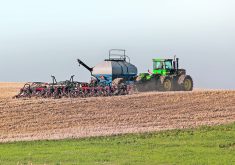I walked up to the conveyor, exhausted after hours of clearing snow and replacing shear pins. I was hoping against hope that its exposed battery was not frozen and that it had enough juice to wake up the Subaru gas engine.
I am a fatalist. I try not to be, but I am. My brain bends toward all the things that could go wrong.
It was cold. The conveyor needed to work because there was a truck coming to load wheat first thing the next morning and I was running out of daylight hours if my grim predictions of everything not working came to be and I needed to tinker.
Read Also

Budget seen as fairly solid, but worrying cracks appear
The reaction from the agriculture industry to prime minister Mark Carney’s first budget handed down November 4th has been largely positive.
I had just spent two days at a hotel in Winnipeg attending the Keystone Agricultural Producers’ annual general meeting. I had just made the one-and-a-half-hour drive back to my farm.
Once home, I cleared the snow from our driveway, yard and from around our bins.
Then, as I parked the tractor and began sauntering over to the conveyor, my mind raced with unhelpful thoughts such as, what if it doesn’t start? What if the conveyor is frozen? What if the semi gets stuck in the yard tomorrow morning?
The conveyor fired up and the belt rotated as it should.
I was tired. It had already been a long week. These were important wins.
The next morning, however, things veered in a different direction.
The truck driver, who was familiar with our conveyor was having trouble getting it to run properly. It needed to be choked, even when warm. And it wasn’t operating at full capacity.
He managed to fill his truck, but it took a while. I had an online meeting, so I wasn’t there to observe the conveyor engine’s deteriorating performance.
He drove past my house, full of wheat and on his way to deliver the first of a few loads. A few minutes later, I looked up from my video meeting to peer outside from the large window overlooking my farmyard. He was still on my driveway. He was stuck. I began missing calls from him. Then, I started to receive texts. My meeting was an important one, but so was the situation unfolding in front of me.
I let the meeting host know that I would need to cut the meeting short.
It took two tractors to get the truck off my driveway, and mice were to blame for the poorly running conveyor. They had eaten the air filter and the pieces they left in the air box had been sucked into the engine. It took a bit, but we got it working.
Winter in Canada, at least in my part of Canada, is predictably cold, and my farm from December to March enters a kind of stasis. Things happen, but differently. A process considered routine in summer takes five times as long, consumes 10 times the energy, and is infinitely more frustrating in winter.
Winter arrives every year. One of the only things I have to do, as a farmer in Manitoba, is become comfortable with this fact and plan accordingly.
- Dress for the weather
- Mouse-proof the places/implements they have been known to frequent
- Run the bin fans once in a while
- Make sure the snowblower is in working condition (and that its configured to effectively cut just above the gravel without digging in or leaving too much behind)
- Occasionally run the trickle charger on all the batteries exposed to winter temps
- Make sure the boundaries of my driveway are obvious
I am sure there is more to consider, and I won’t beat myself up too badly for still struggling to become accustomed to winter on the Prairies.
This winter has been busy. I’m sure you can say the same thing. Running at capacity does not leave much room for considering whether mice have eaten the air filter on your conveyor. And, so I make lists.
We got the conveyor running well enough for him to finish and he did not get stuck again. I am not sure if they’ll be much else happening between now and when the weather starts to turn, but I’ll try to be more ready if things pick up.
Toban Dyck farms in southern Manitoba and shares his thoughts through media platforms.















